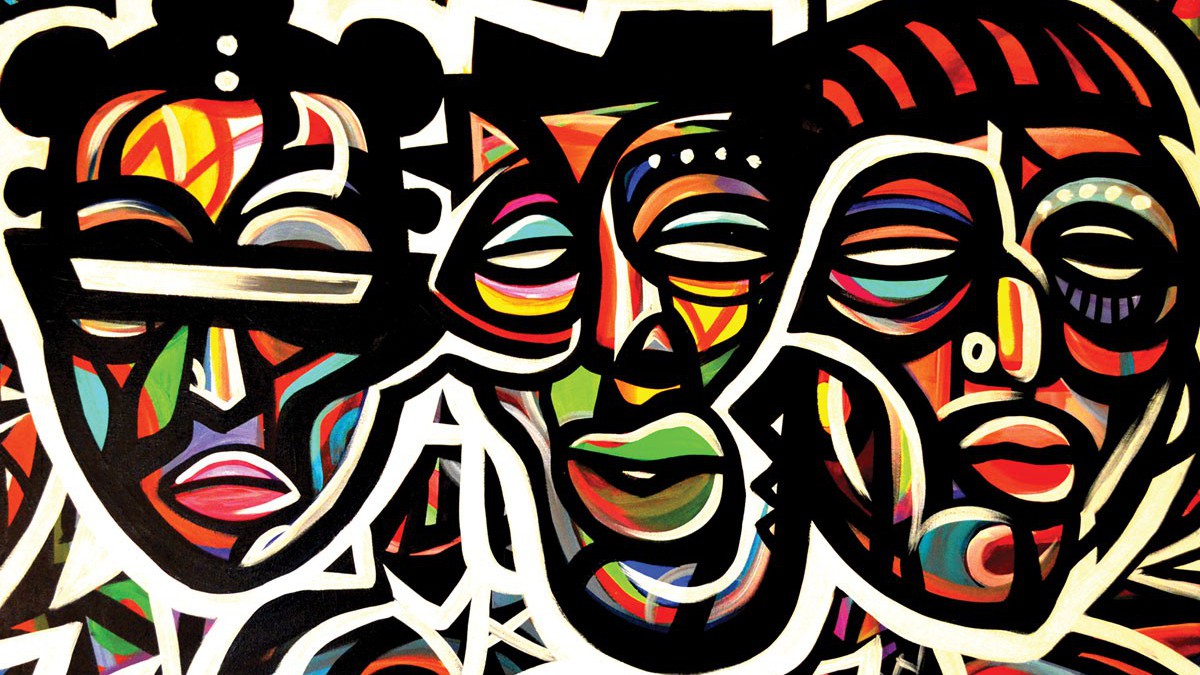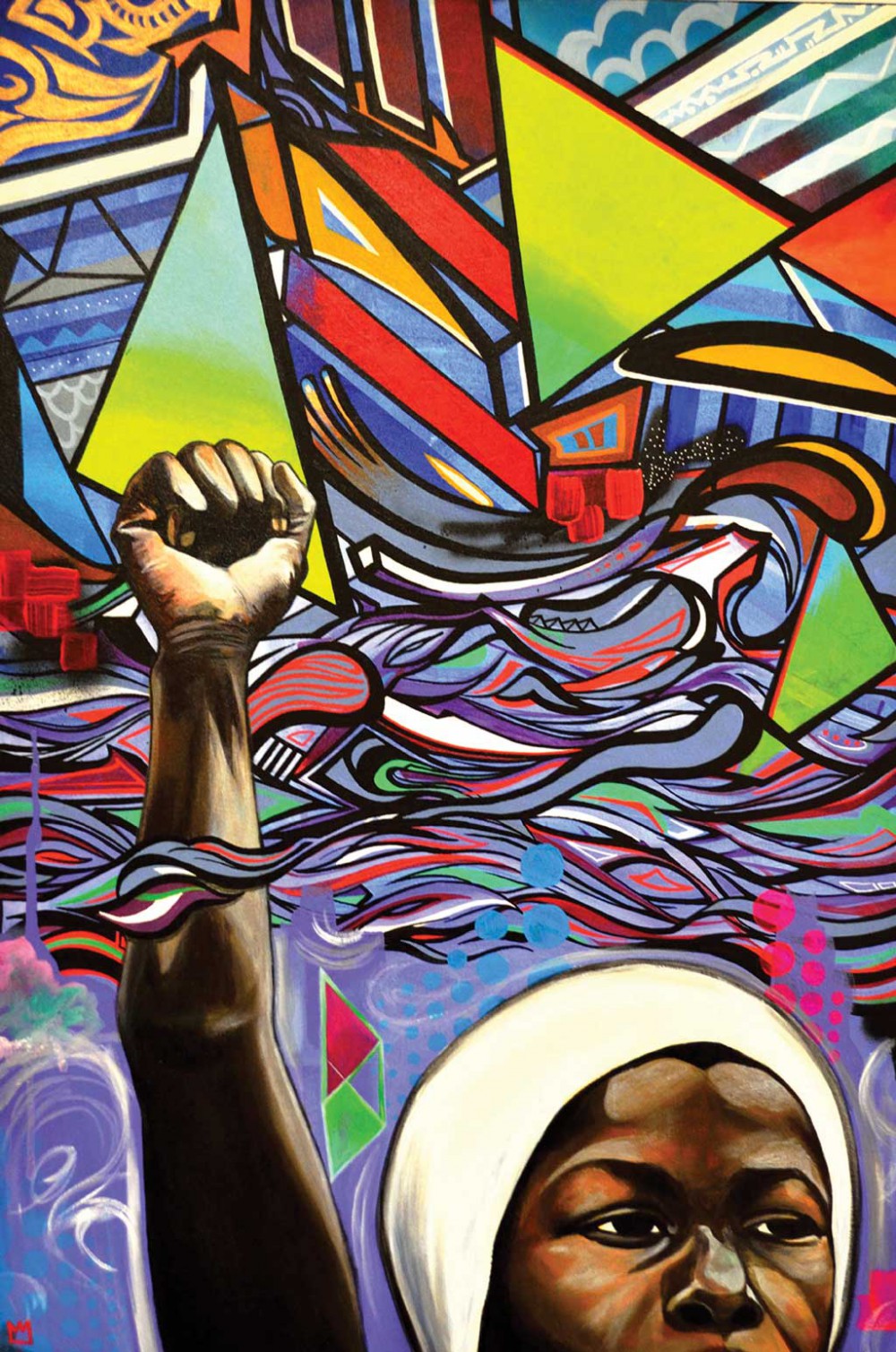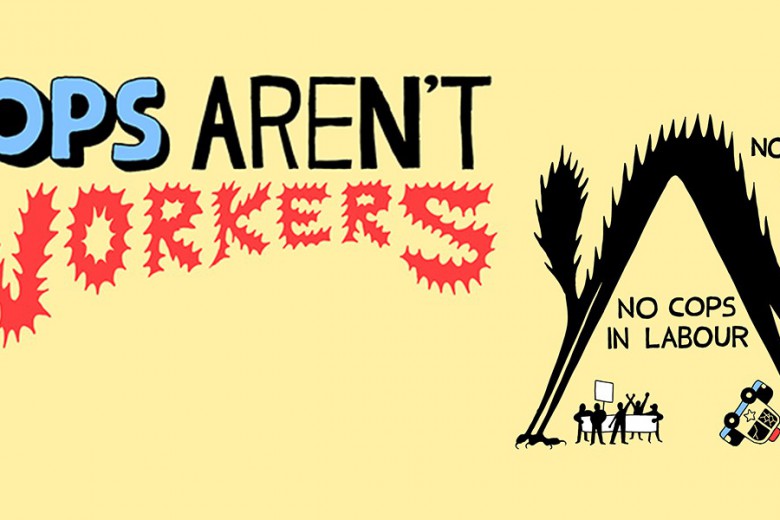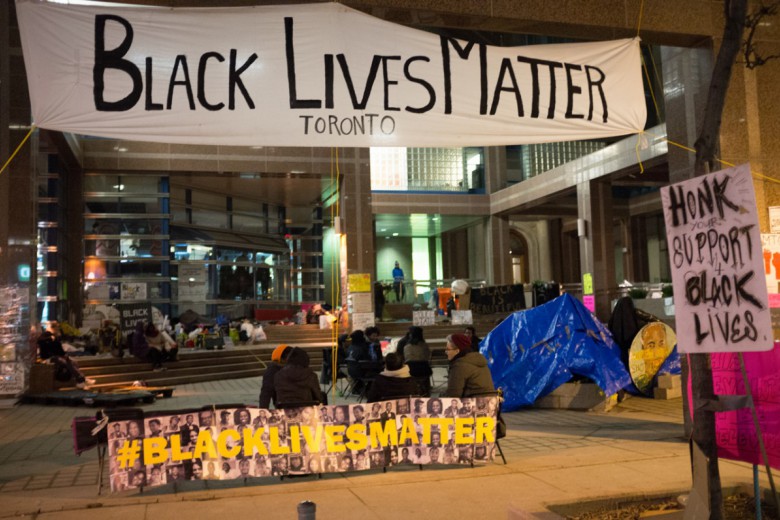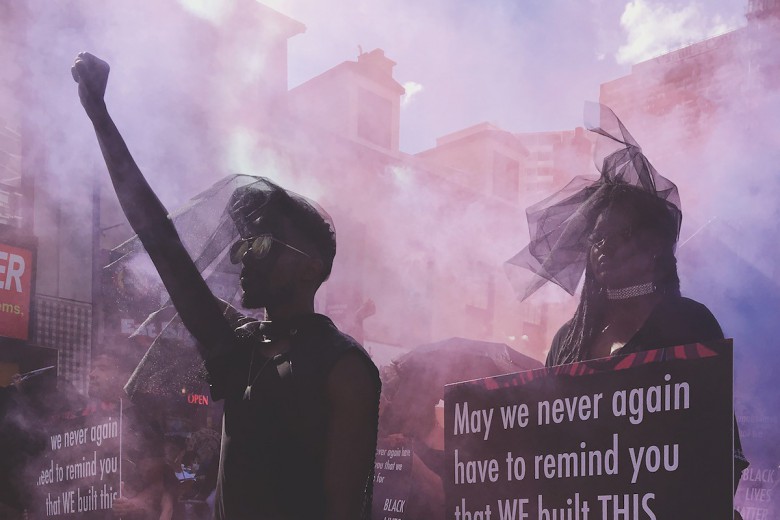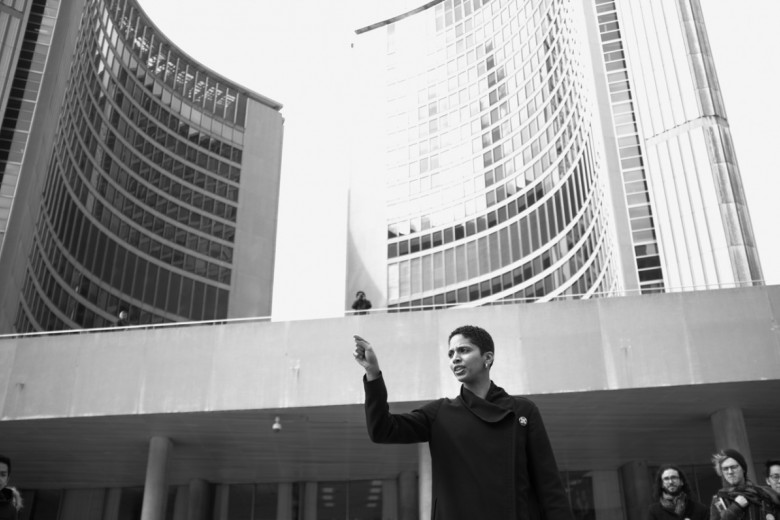Against a backdrop of high-profile police brutality and violence in the killings of Sandra Bland, Trayvon Martin, Andrew Loku, and Jermaine Carby, we are in the midst of a recharged protest movement led by Black people, particularly young folks, who are angry with the systemic racism, sexism, transphobia, homophobia, and economic inequality legitimized by the state.
Armed with the power of social media, feminist and womanist literature, and grassroots organizing communities, activists are spearheading intersectional movements that cast light on issues of police violence, violence against trans folks, and systemic discrimination in the labour and education systems.
It is frustration with the current state of race-based discrimination in Canada that has pushed me to look beyond my own experiences and toward others for their perspectives. We convened a roundtable discussion to get at the heart of issues that are specific to Black folks who are engaged in the Black liberation struggle; their responses highlight the varied beliefs and complex problems facing Black peoples in Canada.
CONTRIBUTORSDANIEL TSEGHAY is a Vancouver-based writer and organizer. He currently writes for RankandFile.ca, a Canadian labour news site.
HAWA Y. MIRE is a diasporic Somali storyteller, writer, and strategist. She is a master of environmental studies candidate at York University, where her research incorporates traditional Somali stories with discourses of constructed identity while pulling from archival histories of resistance and radical curatorial practices.
CASSANDRA THOMPSON is a community educator, activist, published writer, and creator. She is currently the store manager of A Different Booklist, is working on a queer children’s book, and is pursuing her dream of becoming a midwife and doula.
DUANE HALL is an artist and social change agent who is passionate about using a creative approach to discussing mental health and the human condition. He is a founding member and curator of Spoke N’ Heard in Toronto.
CHUKWUMA NWEBUBE attended the University of Guelph, where he was involved with the C.J. Munford Centre, a campus resource center for people of colour. He is committed to dismantling the systems that disenfranchise Black communities.
Are you an activist? If so, what kinds of organizing or resistance work are you (or have you been) a part of?
CHUKWUMA NWEBUBE: Yes, I would consider myself a politically conscious citizen. During my last two years at the University of Guelph, I was deeply involved with the C.J. Munford Centre, a resource centre for students of colour that served as a place of refuge on a white-dominated campus.
CASSANDRA THOMPSON: I would definitely consider myself an activist. The first act of resistance that I take every day is waking up. I’m a queer, Black, radical womxn and I’m alive. This subverts the prescribed systemic plan. Period.
I work on grassroots initiatives, on campus and in the Toronto community more broadly, and I’m on the path to becoming a midwife and a doula for Black and Indigenous queer individuals, which is not only resistance to the patriarchal medical system, but is also an act of reclamation of an African and Indigenous healing and creation practice. I engage in resistance art, as both a writer and a subject in visual art pieces, and I work with Black Lives Matter – Toronto when possible. For me, political consciousness and action is not separated from my everyday personhood. Just as my queerness isn’t, my Blackness isn’t and my femme womxnhood isn’t.
HAWA Y. MIRE: I tend to stay away from terms like activist because the name itself comes laden with additional baggage and is increasingly co-opted by systems that don’t work in my communities’ interests. I have had far too many experiences of “activist” being used as a shield against critique and reflexivity for the harms that are committed in the world. I am more interested in what we do when we believe no one is watching us. How do we treat those we are intimate with? How do we treat those we believe to have little power over us? How do I continue to support Black peoples in all of my interactions? I know myself intimately to be a storyteller, to believe deeply in the work of African feminisms as I follow in the footsteps of my ancestors.
I am currently curating, with Luam Kidane, NSOROMMA, a pan-African arts initiative that incubates, supports, and amplifies insurgent African art and artists. We politicize art as a site for experimentation and building our freedom dreams.
DUANE HALL: These days, anyone who is socially or politically conscious and engaged in dialogue about issues that plague our community is seen as an activist. I am not an activist; that is a very specific role. There are many different roles to play in the progression of our people, and activist is just one of them.
DANIEL TSEGHAY: These days I’m wrapped up in the ongoing refugee crisis. I’m from Eritrea, the country producing the third largest number of refugees crossing the Mediterranean. There are so many stories of what this particular moment means for Eritreans, and many Africans as a whole. It means languishing in refugee camps, being smuggled across the Sahara, sometimes held for ransom, held in detention centres, and risking drowning in the sea, only to reach a continent that doesn’t want you. Lately I’ve been organizing around this, trying to connect individuals and organizations across the country who have noticed that Africans are treated differently than refugees from elsewhere. I’m hoping to make this issue central in Canada.
What is “anti-Blackness,” and what does the term capture that is different from “racism”?
CASSANDRA: “Anti-Blackness” is a prejudice rooted in colonial and capitalist ideology. “Racism” is similar in its roots, but it is necessary to acknowledge that anti-Blackness is a specific prejudice that is targeted at those who identify as being a part of the African diaspora.
HAWA: The language of anti-Blackness helps us understand the layered complexity of white supremacy and the ways in which collapsible terms like “people of colour” or “racism” do not get at the specificity of the experiences of Black communities. Anti-Blackness also helps us to understand the ways in which racialized communities, in a bid to legitimize themselves within white supremacy, actively contribute to the ongoing dehumanization of Black peoples. The intricacies of racism require us to think of context as part of racialization; it is the failure of thinking through that context that necessitates the conceptualization and widespread use of a term like anti-Blackness.
DUANE: Anti-Blackness is a specific form of racism directed specifically to African peoples. To be “anti-,” to be against someone, is different than preferring your own kind, being elitist, or thinking someone is beneath you. With racism, especially in Canada, it can be quite subtle, something not always obvious. Police brutality, systemic oppression, KKK, institutional discrimination, groups of drunk white people – all these are forms of anti-Blackness and are life-threatening situations. But the smile-on-your-face-and-knife-in-your-back moments will always catch you by surprise.
DANIEL: I agree with everybody that there’s something specific about the forms of racism Black people face. Hawa rightly points out that there are hierarchies within racialized communities. But I don’t know if that means anti-Blackness captures something different from racism. It seems like it’s just another way of saying racism … against Black people. Regardless, racism against Black people is definitely different because the conditions of Black people are the product of a history which is different from that of other people. Chattel slavery in the United States, for instance, has brought certain, specific conditions for Black people in the United States. At the same time, a general concept of racism against Black people may not be nuanced enough. What I face as a second-generation immigrant and what my relatives in Eritrea face will be different; the generalized concept of anti-Blackness just doesn’t seem to work. It helps, and it speaks to some shared struggles and understandings and commitments, but, as should be unsurprising since it’s a term attempting to capture such complexities, it’s simply not big enough.
What do you say to the notion that anti-Blackness is less prevalent, or “not as bad” in Canada compared to the U.S.?
DANIEL: In the United States, anti-Black racism is certainly more palpable than here. Black people here are less likely to face some of the more newsworthy forms of racism, from the police brutality to the rhetoric of even candidates for president. But racism has always been more than these extreme acts. “Attention is drawn to the ‘spectacular event’ rather than to the point of origin or the mundane,” write Tamara K. Nopper and Mariame Kaba in a Jacobin essay. “Circulated are the spectacles – dead Black bodies lying in the streets or a Black teenager ambushed by several police officers in military gear, automatic weapons drawn.”
The point of origin, of course, is the basic relationship – whether economic or psychological. It’s a relationship which is inevitably exploitative and damaging to the psyche of the people at the bottom. And I believe it’s one which exists in Canada. The brutal and obvious forms of racism are less prevalent here, but the logic of racism knows no border between Canada and the United States.
HAWA: The myth of race respectability continues to plague Canada. Comparing and contrasting which Black people have more or less violent experiences based on the nation state they live in does exactly what it is meant to do: it absolves all of us from feeling pressure to do the work to change the places where we live.
Anti-Blackness is global, from the Dalit caste in India to the Somali Bantus in Somalia, to Afro-Brazilians in Brazil, to the erased historically Black settlements in Grey County, Ontario. There is nowhere that anti-Blackness is less prevalent, including as part of conversations on shadeism or colourism within Black communities themselves. To say anti-Blackness is less prevalent anywhere is to suggest that white supremacy, imperialism, and colonialism ha[ve] places where they do not function. These are all systems that require a Black body from which to position themselves.
CASSANDRA: Black, as an identity, is experienced differently all over the world, and all of our experiences are relative. I think to compare oppression is to put emphasis on each other’s pain, as opposed to uplifting each other and working together to combat anti-Black racism as it is enacted internationally. The concern should be: how can we strategically work with other cities to learn how they have resisted state-sanctioned violence, and how we can assist them in their resistance and revolution?
DUANE: Canada is a tricky little country. Slaves living in America struggled hard to make it to Canada, where they could finally be free to live the life they preferred. But what they found once they made it over was a nightmare. This is what Canada does best: subversion under the guise of charity. Gentrification is the perfect example – the blueprint, actually. From colonialism, displacing Indigenous peoples onto reserves and taking their land, to historically Black land, such as Africville, where the residents were evicted, their belongings relocated in garbage trucks, right up to this day where residents of Regent Park and Eglinton West [in Toronto], for example, are forced to leave their homes to make room for condos. There is simply no regard for our lives.
How have your personal politics been influenced by the work of the Black Lives Matter (BLM) movement combatting anti-Blackness in North America?
HAWA: BLM adds to the years and years of work that Black organizers have already done across the globe. I say this as a reminder that Black organizing is not a new concept. While BLM has allowed for more conversations within the mainstream, the idea that Black dialogue is only legitimate if approved by white institutions is very troubling. BLM also fails to address the intersectional and intricate experiences of Black peoples – for example, young Somali men who are often both Black and Muslim continue to [be] underrepresented in anti-Blackness discourse while overrepresented in the justice system. Until we look at Blackness as moving beyond a monolithic identity, we fail to build movements that engage Black people with differing experiences. Our work is global, our struggle is global, and the ways in which anti-Blackness becomes a unified rallying cry is only when we can link #BlackLivesMatter to #RhodesMustFall to #CadaanStudies; anti-Blackness does not begin or end in North America.
CASSANDRA: It gave me a team to work with. I know that I am not sitting in isolation with my pain, frustration, anger; I’m not grieving alone because there is a group of people taking disruptive and educational political action against the institutional and systemic anti-Black racism that exists in this world. I really appreciate the affirming Black transfeminist framework that the movement works from. This framework asserts that the healing of our community, in order to move forward, requires the inclusion of the queer and trans Black community in the planning and action. I mean, shit … it’s been us at the front of most movements, anyway: Bayard Rustin, Marsha P. Johnson, Patrisse Cullors … take a look back at who is really doing a lot of the mobilizing and advocacy groundwork.
DUANE: BLM has commendably brought awareness to the diaspora. But what is needed now, more than ever, is internal organizing, not external pleading with the “powers that be,” not external media campaigns and news headlines. It would be interesting to know what would happen if the Black community went completely silent for a period of time, if we had a Blackout, and that time was spent developing internal systems of economy, political organization, education, employment opportunities, business infrastructures to support each other’s initiatives, building and owning our own entertainment outputs, where Black culture could be experienced only on our platforms, building relationships with other countries who support us, the list goes on and on. The country, the world, would have to pay attention. We’ve been sold the idea that Black movement = taking it to the streets.
DANIEL: My personal politics have been profoundly influenced by it, in perhaps surprising ways. I’ve learned a lot about how to bring a clear, specific, and pressing issue onto a major stage. And I’ve also learned a lot from the many criticisms. Many have pointed out that there’s a difference between how Black Lives Matter originated – organically in Ferguson by people directly affected by police brutality – and where it is now. There’s been great work noting that influential and visible members of BLM have taken positions that appear in conflict with the spirit of BLM. There are, for instance, members who support the privatization of education. Some leaders have taken reformist positions and have, in the view of some activists, been co-opted by politicians. Whether all of these criticisms are accurate or not is an open debate. But what it’s raised for me is the question of how to organize. We may agree on goals (ending police brutality), but how we go about doing that matters. I want liberation for both myself and my people badly enough that I don’t just want quick victories or media attention. I want to be a part of building something sustainable and strong – something that can truly ensure victory. This is the time to think about how to do this right.
How is racialized policing experienced in your community or region?
DANIEL: In Vancouver, much of the racialized policing is directed toward Indigenous people. Vancouver’s Downtown Eastside, disproportionately Indigenous, is currently being gentrified at breakneck speed. The gentrification process means displacing people in at least two ways: by raising rents and by physically removing people from public areas that are meant to appeal to investors. The police, of course, serve as the primary enforcer of the latter [displacement].
CASSANDRA: I have been stopped under the assum[ption] that I was in sex work, which is not problematic in and of itself, but conflated with the misogynoir stereotype that Black womxn are constantly hot to get fucked, it becomes a race-based premise and a prejudiced act. I have also had police assume I might exchange sexual favours to get out of a bogus marijuana possession charge. I have known people who have faced physical violence. I have known people who have been harassed almost daily through routine carding practices. There are schools in communities across the city that have police presence regularly, to surveil and curtail “problematic behaviour.” I know specific communities that have a disproportionate number of cruisers and bike cops lingering, again for surveillance. There are close ties between Children’s Aid services, welfare, and other government institutions with the police, which yield […] disproportionately problematic ways in which police interact with racialized people.
HAWA: Mustafa Mattan was a 28-year-old Somali man who had moved from Toronto to Alberta, as many have, to search for better employment. Mattan was shot through the door of his apartment building on February 9, 2015. No killer has been apprehended and media (including social media) have been entirely silent. His death follows the fifty-odd other Somali young men between Toronto and Alberta, killed, shot at, left to rot. The Somali community is notoriously under-represented in Black organizing across Ontario but overrepresented in jails. In the case of Toronto, if we are speaking about racialized policing, carding, or over-policing and militarization, we would be remiss if we did not pay careful attention to Somali community pockets, through which these things run rampant. How is racialized policing not experienced by Black communities? We need to instead be asking why Black communities continue to be subjected to extreme police violence and the ways in which this can be dismantled.
For some, sharing images and videos of police violence against Black people on social media is an effective tool to raise public awareness. For others, it’s painful and violent to have the videos shared and rewatched. What’s your take on the role of technology and videos in the Black Lives Matter movement and anti-racism organizing?
DANIEL: During the heyday of lynchings in the United States, the press used to publicize these murders in gratuitous detail. It was done to keep people informed about the actions of the oppressor. It was meant to tell Black people: “Look at what can happen to you if you get outta line.” Today, few things have changed. Black people are still murdered for nothing. And the media (with some exceptions, of course) are intimately tied with corporate and state power. I wouldn’t put it past the media to – if only subconsciously – give Black people that same lesson today. So, in that light, I don’t know that the seemingly endless parade of images of Black death is good for us.
I personally feel deeply and negatively affected. Some days it’s hard to do much else other than stew about what I’ve just seen. Also, I resent that we need to see such images to make the case. Shouldn’t we all just get it by now? Why do Black people have to give their lives for other people to care? Saying that, of course technology has helped. It’s helped poke major holes in what cops say. They lie. They tell us some Black person, for no reason, went berserk and started being a threat to everybody, including the armed and trained officer. But then we watch the videos and we know the truth. So, yeah, it helps in certain cases. But, we shouldn’t rely on it. We should be quick to assume the cops, because it’s the nature of their position, are murderers.
DUANE: I’m tired of seeing Black bodies on my timeline. I think it needs to stop. You can have awareness without seeing blood and guts. Our mental health is at stake and that’s worth honouring. Our ancestors deserve better.
CASSANDRA: I can’t watch most of the videos. To be honest, I’ve still not been able to watch Eric Garner die. I can’t. It hurts too much. And there are so many. So many. Our spirits weren’t made to withstand watching our family get murdered on repeat. That’s unhealthy. That’s trauma. I don’t need the evidence. My soul doesn’t need the abuse. It’s had enough.
CHUKWUMA: It depends on the person sharing these videos and images. If it is coming from a Black individual, then I am in full support, as they are directly related to the issue. However, when it comes from a non-PoC, I don’t necessarily believe that this is the correct method of spreading awareness. Oftentimes posting these articles can re-traumatize Black people, and it does nothing to aid in our fight against anti-Black racism. Instead of posting an article, they should discuss their role in the system and find effective ways to support Black people in their fight.
HAWA: When non-Black people share videos of police brutality with surprise and shock, I resent the sharing in and of itself. Why is the burden of proof on Black communities to substantiate their claims of being racially profiled, of being killed or already being expected to die? I confess that my recent quiet on social media is from exhaustion at seeing people who look like me, who could very well be me or people I love, killed every day. I do not want to be reminded of a continual refusal to see my humanity. In sharing these videos, I can’t help but believe that we demonstrate our deaths for the white gaze, never fully understanding that it does not in fact give us justice. Demanding another police officer be incarcerated or punished does not change or remove the death itself, it does not dismantle a system intent on Black people’s demise.
We need more conversations as Black people as to the strategies we use as we organize. We need more time just among one another to grieve our dead and our ongoing dying. While I do not discount that there is a great power in the use of technology in connecting Black liberation and struggle across the globe, there is also great devastation in being subjected to [the] ongoing dehumanization of my peoples.
Some important critiques coming from the movements targeting anti-Blackness include the fact that the experiences of cisgender, heterosexual Black men with police have dominated the media conversations. What do you think should be done to ensure that the voices of women, gender non-conforming folks, trans folks, and queer people are amplified in these movements?
HAWA: These critiques are not unusual; similar critiques were levied at Black nationalist and civil rights movements. Those for whom the risk and costs are greater in our communities should be centralized in our movements. In all places, at all points in the process, we should be asking ourselves who is missing and why? Whose voice requires amplification, whose experiences shape our movements? Whose blood is taken for granted? Whose work do we continually take and not credit? In whose name do we forget to march? None of these are easy questions. We rarely see queer Black muslimahs at the forefront. We rarely see people with disabilities or mad, gender non-conforming folks on the front lines. We use language and resources to appear middle class, to legitimize ourselves as we move. Even within Black communities, it is the small decisions that expose our ideas of who we consider disposable.
DANIEL: For the most part, the issue that’s most recognizable within BLM is police brutality. And the reality is that Black men are typically the victims there. So, as long as that’s the issue, Black men will disproportionately be the focus of the movement. I think one way to amplify everybody else is to widen the number of issues. Police brutality is, of course, incredibly important and is something Black people feel has to be halted immediately, but it’s not the only pressing issue. Racism manifests itself in countless ways, many of which could lead to death in subtle ways. If we’re talking about housing, that could affect women as much or more than men. If it’s austerity measures, that could affect women more than men. Anti-Black racism is just a structure but it has countless manifestations and police brutality is just one, though the most sensational, form.
CASSANDRA: People who do not know the lived experience of being trans or queer cannot liberate us. If you have not lived through it, you don’t know what we need. It’s the same idea as having white folks telling us what we need to feel safe, free, and supported as Black people. It is counterintuitive and oppressive in its construction. We need to publicize queer and trans experiences and we need to talk about the womxn and queer and trans people who have been leading our healing efforts and our resistance. We need to reveal their his/herstories. We need to prioritize and frame the Black trans, Black womxn’s, and Black queer struggle as part of the “Black struggle.” I think that Black Lives Matter is attempting to do that, but we need to stand behind this as a people. We really have to start there.
Moyo Rainos Mutamba has written, “Racism and colonialism root the Canadian nation state and they continue to sustain it.” Leanne Betasamosake Simpson has similarly argued that “Black and Indigenous communities of struggle are deeply connected through our experiences with colonialism, oppression and white supremacy.” What are some strategies for strengthening the links between anti-colonial and anti-racism struggles to dismantle white supremacy?
DANIEL: I’ve thought a lot about why Eritreans are fleeing the country and risking death by dehydration in the Sahara, detention in Libya, drowning in the Mediterranean, and, after all that, expulsion from Europe. The main reason is that most Eritrean adults are, essentially, enslaved labourers, working on various state-run projects. They work indefinitely (sometimes over 10 years) with little pay and terrible work conditions. The prospect of living that way is a major reason people are fleeing. Currently, there are a few mining sites that employ these workers. One of them is owned by a Vancouver mining company, Nevsun Resources Ltd. I personally see projects like that – extraction of resources from one country enriching another – as simple colonialism. And that’s where the struggles of Indigenous peoples and Black people intertwine. The reality is we have a common enemy and it’s time we recognize it and work together. I think one strategy to help that happen is to take a specific issue (like mining in Eritrea) and connect it to similar struggles locally (Indigenous people throughout Canada [being] displaced and poisoned by extraction).
CASSANDRA: Anti-Blackness is a result of capitalism and colonialism, just as Indigenous oppression is. I’d suggest we look to parts of Nova Scotia for historical guidance and study their examples of building Black and Indigenous communities as an ideal start. Sankofa – the traditional Akan concept that teaches us to look back in order to move forward – reflects this practice.
HAWA: I do not forget that we live in a white supremacist, imperialist, patriarchal, colonial society. When we begin to believe our individual experiences are somehow more important than our collective liberation and struggle, we fail again to build coalition and solidarity in the places that matter. To deeply understand anti-Blackness and colonialism as two sides of the same coin require[s] us to understand that the society in which we live is sustained by the dispossession of Indigenous lands and dispossession of Black labour/bodies. I believe my work is understanding the ongoing colonialism on the lands I do my work. How can my organizing disrupt other power dynamics that are at play?
Many have brought attention to the fact that one of the lasting effects of racism is damage to the physical and mental health of its targets. How does this connection between racism and health affect the way anti-racist work is organized?
CHUKWUMA: This question could be a conversation on its own, but to summarize: Black people have been taught not to love themselves. Growing up in a society in which white is the ideal and Black is imperfect can cause long-lasting damage. It took a long time for me to be fully accepting and proud of my Blackness. To this day, though, I find myself lingering between feelings of intense anger and sadness constantly. I am now a man with no patience and zero tolerance with regard to issues of race. There is literally a genocide occurring on Black bodies in today’s society, and it hurts me so much. I’m unsure of how to cope.
DANIEL: It deepens my commitment. While it can often debilitate me (as I said earlier about the endless images of Black death), the racism I’ve experienced keeps me angry and focused. I don’t want anybody else to experience what those us who’ve come before have.
CASSANDRA: We need to massage our DNA strands and excise the post-traumatic (en)slaved syndrome we all carry as descendants of the African diaspora living in the West. We need to have the emotional and mental strength and empowered sense of self to fight back as a people, as a team.
HAWA: This work is exhausting. There are not enough words to articulate the ways in which this exhaustion manifests itself. Black people doing work in their communities are more often than not doing that work as a result of wounding. And yet we continue to survive, persevere, and thrive. We continue to be magical.
Do you think electoral changes in government, specifically the Liberal government’s seeming commitment to diversity, can have an effect on race relations in Canada?
DUANE: No. The faces have switched over, but the bodies remain the same. This machine has been in effect since colonization and it will remain in effect, operating under the very same mandate, trying to achieve the same goals, until it is dismantled.
HAWA: I do not believe that the Liberal government’s commitment to diversity does anything to improve race relations in Canada. In fact, I believe the Liberal party, though certainly less offensive than the recent Harper Conservatives, still functions largely using conservative values. I don’t think that appealing to the systems we live in to recognize and see us is a strategic method forward. Blow it up. Blow the system up. I have no interest in conversations that begin and end with diversity. I have no interest in conversations that look at me as little more than a choice on a platter of other similarly brown-hued people as a model from which to rebuild our world and work in the interests of my community. I have more interest in thinking through what diversity does to mimic power structures of the society in which we live, and what draws racialized people toward ideas of tolerance and recognition instead of resistance and revolution.
CHUKWUMA: Anti-Black racism is systemic, and must be attacked at its root. A new Liberal government will not do this.
DANIEL: Malcolm X once said, “You can’t legislate good will.” While I can maybe agree that electoral changes will be a part of a bigger project, I don’t want to emphasize it. Yes, people need immediate changes and I support reforms if they have a tangible effect on someone’s life. But I don’t believe in the political system. I believe race relations will improve when communities are empowered, not when parties are elected. [The Liberals’] policies are deplorable in nearly every way. Diversity on the surface is nice, and, maybe in some limited ways it opens a discussion and raises consciousness, but it can also be seen as simple PR. I don’t buy it and I hope more Black people see through it as well.
CASSANDRA: “For the master’s tools will never dismantle the master’s house. They may allow us temporarily to beat him at his own game, but they will never enable us to bring about genuine change” – Audre Lorde.


